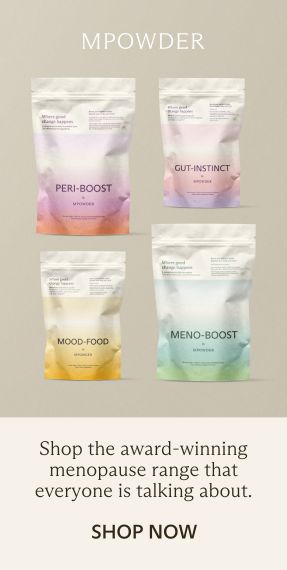Reflections on the latest clinical research into the power of plants.
This weekend MPowder attended VegMed - a 2 day event in London focused on presenting the clinical evidence of the power of plants to treat the most common diseases in society. The key message to the professional community was that we now have enough scientific evidence to prescribe plant food as a valuable ‘medicine’ for general good health as well as the first line of treatment for many of today’s most common diseases.
We know that many of you in the MPowder community are already changing how you eat. 32% of the women we interviewed this summer found diet the most effective way to manage their symptoms.
It is worth the effort. Research shared at VegMed showcased the role of plants in protecting against the diseases we are at increased risk of as we enter the menopause - specifically coronary heart disease, diabetes and high blood pressure.
We didn’t need convincing. Clinical research into the impact of fruit, vegetables, vitamins and botanicals on menopausal health motivated us to build MPowder. But what excited us from the data shared at VegMed was the speed at which the body can heal.
By prescribing a simple plant based diet, doctors and clinicians have documented:
A reversal in coronary heart disease in just 3 weeks: We tend to think of heart disease as a male disease. But, as women, our risk of heart disease increases as the amount of oestrogen our body produces decreases. In fact, heart disease is the leading cause of female premature death post-menopause. You can read the data behind one of the research pieces referenced at VegMed here (note, you may need to register, but it is free).
A 60% reduction in insulin requirements in diabetics within 16 days: Type 2 Diabetes (T2D) is on the rise across the globe and can hit women particularly hard. As we transition through the menopause, hormonal changes can trigger blood sugar fluctuation, which can make managing Diabetes tougher too. Dr Michael Greger outlined compelling evidence for the power of plants to reduce and in some cases reverse T2D entirely through a plant based diet. See the bones of his presentation at VegMed here (note, some of the case studies cited are male-only cohorts).
Just 7 days to see a reduction in blood pressure. Blood pressure can increase through the menopause as our oestrogen levels decrease, our metabolism changes and we become more sensitive to sodium. But a plant based diet can have a dramatic impact. Again, the core research referenced can be read here.
Diet is now the largest contributing factor to disease in the UK. To put that in context; what we eat causes more damage to our health today than smoking, blood pressure, our weight or the amount of physical exercise we do. But our bodies are naturally self-healing machines. If we put the right stuff in, we can thrive.
What we need, as we transition through the menopause, is scientifically backed nutritional guidance on what to eat and where to supplement, so we are empowered to make informed changes with confidence. Training given to medical professionals on the front line needs a fundamental rethink. Doctors at the conference highlighted that they receive just 4 hours of nutritional education prior to qualification. Many feel they enter their profession without the facts they need at their fingertips to effectively guide.
The MPowder range has been formulated to pack as many of the foundational nutritional requirements you need at each stage of the menopause into one daily delicious scoop. But we don’t launch until early next year! Plus, the more you can nourish your gut by selecting smart ingredients when you cook, the better the results you will see.
So, below are 5 easy additions to mix into your routine to change your body’s response to the change now:
-
Eat your greens: Kale, particularly, is packed full of essential B vitamins and folate. These nutrients are essential for the liver - which in turn plays a part in breaking down and regulating hormones that support the delicate balance of oestrogen, progesterone and testosterone. A healthy liver also helps alleviate PMS which can be heightened during the peri-menopause.
-
And your grains: Go for whole grains whenever you can. Nutritionist and dietician Brenda Davis highlighted the ‘hierarchy’ of whole grains at VegMed. As they are processed they can lose 70-80% of their mineral content so choose intact whole grains like barley, oat groats and quinoa.
-
Increase the amount of Omega 3 (ALA) on your plate: Look to walnuts, flaxseeds, chia seeds and hempseeds to up your Omega 3 intake if you are Vegan and introduce from the peri-menopause onwards.
-
Cinnamon: It has a super-power that makes everything taste good. It is also a very good blood sugar regulator which, in turn, helps our bodies to manage appetite and maintain a healthy weight.
-
Consider smart supplements: We believe that whole plant foods are the best way to get the nutrients your body needs. But modern lifestyles make a few critical vitamins really difficult to access:
B12: It turns out our grandmothers’ were right (AGAIN!) - a little bit of dirt really is good for you. B12 is critical to your body - particularly in the menopause. It is most commonly found in soil and fresh spring water. Today, we’ve cleaned and sterilised life so much we need it in a supplement form to hit our daily nutritional needs - particularly if we’re reducing meat consumption. B12 can help with sleep regulation, energy levels, supporting gut health and supporting your heart and brain.
Vitamin D: It simply isn’t sunny enough here (editor’s note; as I review this, I swear it has been raining continuously for 10 days). Unless you spend all your time outside, a daily supplement is sensible. It helps you absorb calcium. But it also helps with mood, energy levels and sleep too.
Magnesium: Grains and greens contain good amounts of Magnesium. But in our research this summer, many of you also told us you find taking it as a supplement helpful in reducing severity of hot flashes and regulating sleep. It is good for your bones, your heart and can reduce blood pressure and help regulate mood. Look for the Magnesium Glycinate on your health food aisles; it is kinder to the gut and easier to absorb.
Omega 3 from fish oil: For those of you not on a vegan diet, it is worth considering a high potency fish oil supplement. Do your homework and only spend money on the ones that have the concentration of DHA and EPA to make an impact. Our favourite is Lion Heart from the team at Bare Biology.
With all new supplement additions to your diet, make sure you talk to a doctor, particularly if you’re about to have surgery, have an existing health condition, or are on blood thinners.
Share Twitter Facebook Pinterest

